
This list of compositions by Alexander Borodin is sorted by genre.

This list of compositions by Alexander Borodin is sorted by genre.
| Title | Start | End | Libretto | Notes |
|---|---|---|---|---|
| The Tsar's Bride | 1867 | 1868 | sketches, lost | |
| Bogatyri | 1878 | Viktor Krylov | Opera farce in 5 Scenes, based on music by Rossini, Meyerbeer, Offenbach, Serov, Verdi, etc., orchestrated by E. Merten | |
| Prince Igor | 1869 | 1887 | Borodin, after "The Lay of Prince Igor" | Unfinished opera with a prologue and 4 acts. Orch. Rimsky-Korsakov and Glazunov 1887/88. First performance, St. Petersburg 1890 |
| Mlada , Act 4 | 1872 | 1872 | Viktor Krylov | Part of unperformed collaborative ballet-opera-spectacle by Cui (Act 1), Mussorgsky and Rimsky-Korsakov (Acts 2 and 3), and Borodin (Act 4), with ballet music by Minkus. Borodin used material from his unfinished Prince Igor as the basis for Act 4. Finale orchestrated by Rimsky-Korsakov as a concert piece (1892) |
| Title | Start | End | Notes |
|---|---|---|---|
| Symphony No. 1 in E-flat | 1862 | 1867 | First published 1875 (arr. piano 4 hands by the composer); 1882 (full score) |
| Symphony No. 2 in B minor | 1869 | 1876 | first pub. 1878 (arr. piano 4 hands by the composer); Borodin's orchestration slightly revised by Rimsky-Korsakov and Glazunov for publication of 1887 full score. [1] |
| In the Steppes of Central Asia | 1880 | 1880 | first pub. 1882 (arr. piano 4 hands by the composer); 1882 (full score) |
| Symphony No. 3 in A minor | 1886 | 1887 | first two movements only, completed and orchestrated by Glazunov. |
| Title | Start | End | Notes |
|---|---|---|---|
| Piano Trio | 1850 | 1860 | 3 movements only, last movement is lost |
| Quartet for flute, oboe, viola, and cello | 1852 | 1856 | based on music by Joseph Haydn |
| String Trio in G major for 2 violins and cello | 1852 ? | 1856 ? | only first 2 movements completed |
| String Trio in G minor for 2 violins and cello | 1855 | 1855 | One movement (Andantino) only. Based on the Russian folk-song "Чем тебя я огорчила" (Chem tebya ya ogorchila) "What did I do to upset you" |
| String Quintet in F minor for 2 violins, viola and 2 cellos | 1859 | 1860 | coda of finale completed by O.A. Yevlachov (1960) |
| String Sextet in D minor | 1860 | 1861 | only two movements survive |
| Sonata in B minor for cello and piano | 1860 | 1860 | Based on the Fugue from J. S. Bach's Violin Sonata no. 1 in G minor BWV 1001 |
| Piano Trio in D major | 1860 | 1861 | for violin, cello and piano |
| Piano Quintet in C minor | 1862 | 1862 | for string quartet and piano |
| String Quartet No. 1 in A | 1874 | 1879 | |
| String Quartet No. 2 in D | 1881 | 1881 | |
| Scherzo for String Quartet | 1882 | 1882 | from Mitrofan Belyayev's collection "Fridays". Also used by Glazunov in his completion of Borodin's 3rd Symphony |
| Serenata alla spagnola for String Quartet | 1886 | 1886 | From the collective quartet "B-La-F" with Rimsky-Korsakov, Glazunov and Lyadov |
| Title | Hands | Start | End | Notes |
|---|---|---|---|---|
| Petite Suite | 2 | c1870 | 1885 | 1. At the Convent 2. Intermezzo 3. Mazurka I 4. Mazurka II 5. Rêverie 6. Serénade 7. Nocturne. Orchestrated by Glazunov, including the A-flat Scherzo (below) as part of the last movement |
| Scherzo in A-flat | 2 | 1885 | Arr. 4 hands by Théodore Jadoul, the dedicatee. Included in the last movement of Glazunov's orchestration of the Petite Suite (above). | |
| Paraphrases on Chopsticks | 3 | 1874 | 1878 | Polka, Funeral March, Requiem (with words) and Mazurka; in a collection of pieces by Borodin, Cui, Lyadov and Rimsky-Korsakov. 2nd edition includes pieces by Liszt and Nikolai Shcherbachov |
| Hélène-Polka in D minor | 4 | 1843 | 1861 | written in 1843 when the composer was 9 years old, revised and transcribed for 4 hands by the composer in 1861. [2] |
| Allegretto in D-flat | 4 | 1861 | Arrangement of the 3rd movement of the String Quintet | |
| Scherzo in E major | 4 | 1861 | ||
| Tarantella in D major | 4 | 1862 |
| Title | Russian | Transliteration | Original Text | Start | End | Notes |
|---|---|---|---|---|---|---|
| Why did you grow pale early | Что ты рано, зоренька | Shto ty rano, zaren'ka | Sergey Solovyov | 1852 | 1855 | |
| The beautiful girl does not love me | Разлюбила красна девица | Razlyubila krasna devitsa | A. Vinogradov | 1853 | 1855 | for voice, cello and piano |
| Listen to my song, my friends | Слушайте, подруженьки, песенку мою | Slushaite, podruzhen'ki, pesenku moyu | Iven Kruse | 1853 | 1855 | for voice, cello and piano |
| Thou lovely fisher-girl | Красавица рыбачка! | Krasavitsa rybachka | Heinrich Heine | 1854 | 1855 | for voice, cello and piano. Ger. original: "Du schönes Fischermädchen" |
| The Sleeping Princess | Спящая княжна | Spyashchaya knyazhna | Borodin | 1867 | 1867 | also orch. Rimsky-Korsakov |
| My songs are full of poison | Отравой полны мои песни | Otravoy polny moyi pyesni | Heine | 1868 | 1868 | Ger. original "Vergiftet sind meine Lieder" |
| The Sea Princess | Морская царевна | Morskaya Tsar'yevna | Borodin | 1868 | 1868 | |
| Song of the Dark Woods (Old song) | Песня темного леса (Старая песня) | Pesnya tyomnovo lesa | Borodin | 1868 | 1868 | also arr. Glazunov for two-part male chorus and orch. (1873) |
| The False Note | Фальшивая нота | Fal'shivaya nota | Borodin | 1868 | 1868 | |
| The Sea | Mope | Mor'ye | Borodin | 1870 | 1870 | orch. by the composer (1884) and also by Rimsky-Korsakov (1896) |
| From my tears | Из слез моих | Iz slyoz moyikh | Heine | 1870 | 1870 | Ger. original: "Aus meinen Tränen" |
| For the shores of your far homeland | Для берегов отчизны дальной | Dlya beregov otchizny dal'noy | Pushkin | 1881 | 1881 | Published 1888. Also orchestrated by Glazunov (1912) |
| To the people at home | У людей-то в дому | U lyudey-to v domu | Nekrasov | 1881 | 1881 | |
| Arabian melody | Арабская мелодия | Arabskaya Melodiya | Borodin | 1881 | 1881 | |
| Pride | Спесь | Spjes' | A. K. Tolstoy | 1884 | 1885 | |
| The Magic Garden | Чудный сад | Chudnyy sad | Georges Collin | 1885 | 1885 | Fr. original "Septain" |
| Title | Date | Notes | |
|---|---|---|---|
| Serenade of Four Knights for One Lady | comic quartet for male voices and piano | 1870 | |
| God save Kyril! God save Methodius! | for unaccompanied men's chorus | 1885 | unfinished, completed by Pavel Lamm |
| Title | Date | Notes |
|---|---|---|
| Allegretto in D-flat | 1861 | arrangement of the 3rd movement of the String Quintet |
| Symphony No. 1 | 1875 | |
| Symphony No. 2 | 1878 | |
| In the Steppes of Central Asia | 1882 | |
| String Quartet No. 1 | 1887 |
| Title | Date | Notes |
|---|---|---|
| Concerto in D for flute and piano | 1847 | |
| String Trio for 2 violins and cello | 1847 | on a theme from Meyerbeer's Robert le Diable |
| Le Courant – etude for piano | 1849 | |
| Fantasy on a theme by Hummel | 1849 | |
| Fugues – for piano | 1851/52 | |
| Scherzo in B minor for piano | 1852 | |
| Fugue for piano | 1862 |

Prince Igor is an opera in four acts with a prologue, written and composed by Alexander Borodin. The composer adapted the libretto from the early Russian epic The Lay of Igor's Host, which recounts the campaign of the 12th-century prince Igor Svyatoslavich against the invading Cuman ("Polovtsian") tribes in 1185. He also incorporated material drawn from two medieval Kievan chronicles. The opera was left unfinished upon the composer's death in 1887 and was edited and completed by Nikolai Rimsky-Korsakov and Alexander Glazunov. It was first performed in St. Petersburg, Russia, in 1890.

Nikolai Andreyevich Rimsky-Korsakov was a Russian composer, a member of the group of composers known as The Five. He was a master of orchestration. His best-known orchestral compositions—Capriccio Espagnol, the Russian Easter Festival Overture, and the symphonic suite Scheherazade—are staples of the classical music repertoire, along with suites and excerpts from some of his fifteen operas. Scheherazade is an example of his frequent use of fairy-tale and folk subjects.

The Five, also known as the Mighty Handful or The Mighty Five, were five prominent 19th-century Russian composers who worked together to create a distinct national style of classical music: Mily Balakirev, César Cui, Modest Mussorgsky, Nikolai Rimsky-Korsakov and Alexander Borodin. They lived in Saint Petersburg and collaborated from 1856 to 1870.
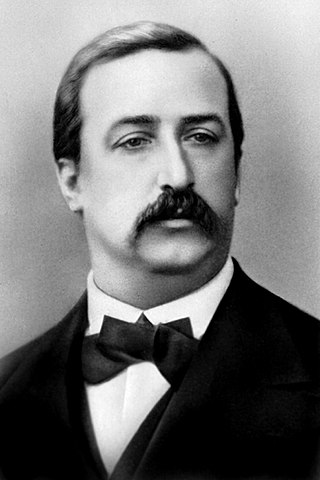
Alexander Porfiryevich Borodin was a Romantic composer and chemist of Georgian-Russian extraction. He was one of the prominent 19th-century composers known as "The Five", a group dedicated to producing a "uniquely Russian" kind of classical music. Borodin is known best for his symphonies, his two string quartets, the symphonic poem In the Steppes of Central Asia and his opera Prince Igor.

César Antonovich Cui was a Russian composer and music critic, member of the Belyayev circle and The Five – a group of composers combined by the idea of creating a specifically Russian type of music. As an officer of the Imperial Russian Army, he rose to the rank of Engineer-General, taught fortifications in Russian military academies and wrote a number of monographs on the subject.
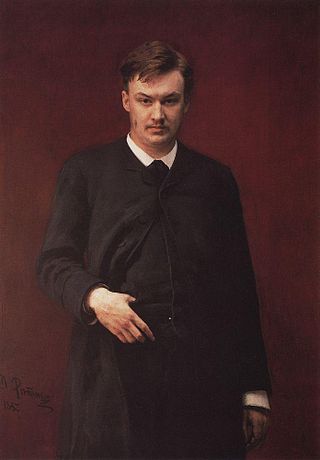
Alexander Konstantinovich Glazunov was a Russian composer, music teacher, and conductor of the late Russian Romantic period. He was director of the Saint Petersburg Conservatory between 1905 and 1928 and was instrumental in the reorganization of the institute into the Petrograd Conservatory, then the Leningrad Conservatory, following the Bolshevik Revolution. He continued as head of the Conservatory until 1930, though he had left the Soviet Union in 1928 and did not return. The best-known student under his tenure during the early Soviet years was Dmitri Shostakovich.
"Baubles, Bangles, & Beads" is a popular song from the 1953 musical Kismet, credited to Robert Wright and George Forrest.

Alexander Sergeyevich Dargomyzhsky was a 19th-century Russian composer. He bridged the gap in Russian opera composition between Mikhail Glinka and the later generation of The Five and Pyotr Ilyich Tchaikovsky.
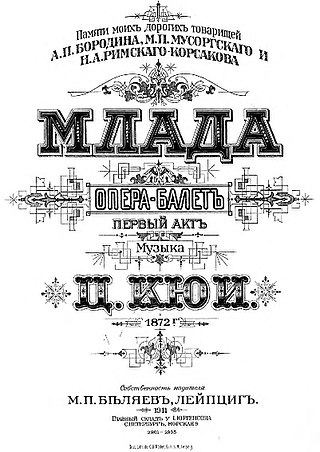
Mlada was a project conceived in 1870 by Stepan Gedeonov (1816–1878), director of the Saint Petersburg Imperial Theatres, originally envisioned as a ballet to be composed by Aleksandr Serov with choreography by Marius Petipa.

Alexander Sergeyevich Taneyev was a Russian state official and composer of the late Romantic era, specifically of the nationalist school. Among his better-known works were three string quartets, believed to have been composed between 1898 and 1900.

Mitrofan Petrovich Belyayev was a Russian music publisher, outstanding philanthropist, and the owner of a large wood dealership enterprise in Russia. He was also the founder of the Belyayev circle, a society of musicians in Russia whose members included Nikolai Rimsky-Korsakov, Alexander Glazunov and Anatoly Lyadov. His surname is often transliterated as Belaieff or Belayev. In 1886 the Russian painter Ilya Repin made a portrait of Belyayev.
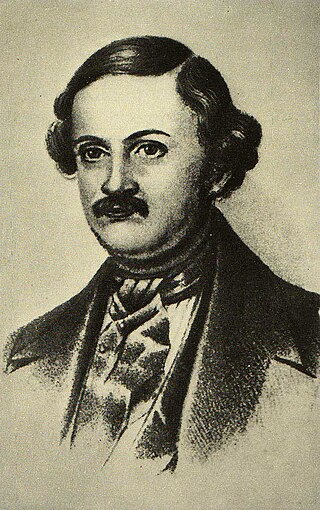
Alexander Egorovich Varlamov was a 19th-century composer, singer, teacher, conductor, and one of the founding fathers of the genre of the Russian art song. He is recorded as being one of the first Russian creators to devise a technical process of singing in his monograph, Polnaya Shkola Penia - The Complete School of Singing He was also the notable father of Russian, 20th-century Actor Konstantin Varlamov and the great-grandfather of 20th-century composer Alexander Vladimirovich Varlamov. His art songs were famed for their Russian motives and authentic capture of everyday experiences. So much so that many of his songs were immortalized in literature by notable Russian and American Authors and Playwrights such as N. Gogol, I. Turgenev, and J. Galsworthy.
Alexander Borisovich Goldenweiser was a Russian and Soviet pianist, teacher and composer.

Symphony No. 2 in B minor by Alexander Borodin was composed intermittently between 1869 and 1876. It consists of four movements and is considered the most important large-scale work completed by the composer himself. It has many melodic resemblances to both Prince Igor and Mlada, two theatre works that diverted Borodin's attention on and off during the six years of composition.
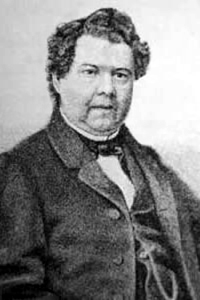
Alexandre Ivanovich Dubuque, also Alexander and Dubuc, was a 19th-century Russian pianist, composer and teacher of French descent.

Alexander Borodin's Scherzo in A-flat major is a lively piece written in 1885, while Borodin was in Belgium for an early performance of his then incomplete opera Prince Igor. It was originally written for solo piano, but in 1889 Alexander Glazunov orchestrated it, along with the Petite Suite. Borodin dedicated the piece to Théodore Jadoul, who made a four-hand piano arrangement of it.
The Solzhenitsyn Prize is a non-governmental Russian literary award established by the Russian writer Alexander Solzhenitsyn in 1997.
The Petite Suite is a suite of seven piano pieces, written by Alexander Borodin, and acknowledged as his major work for the piano. It was published in 1885, although some of the pieces had been written as far back as the late 1870s. After Borodin's death, Alexander Glazunov orchestrated the work, and added his orchestration of another of Borodin's pieces as an eighth number.
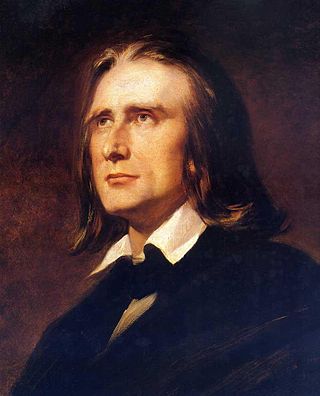
This article lists the various treatments given by Franz Liszt to the works of almost 100 other composers.